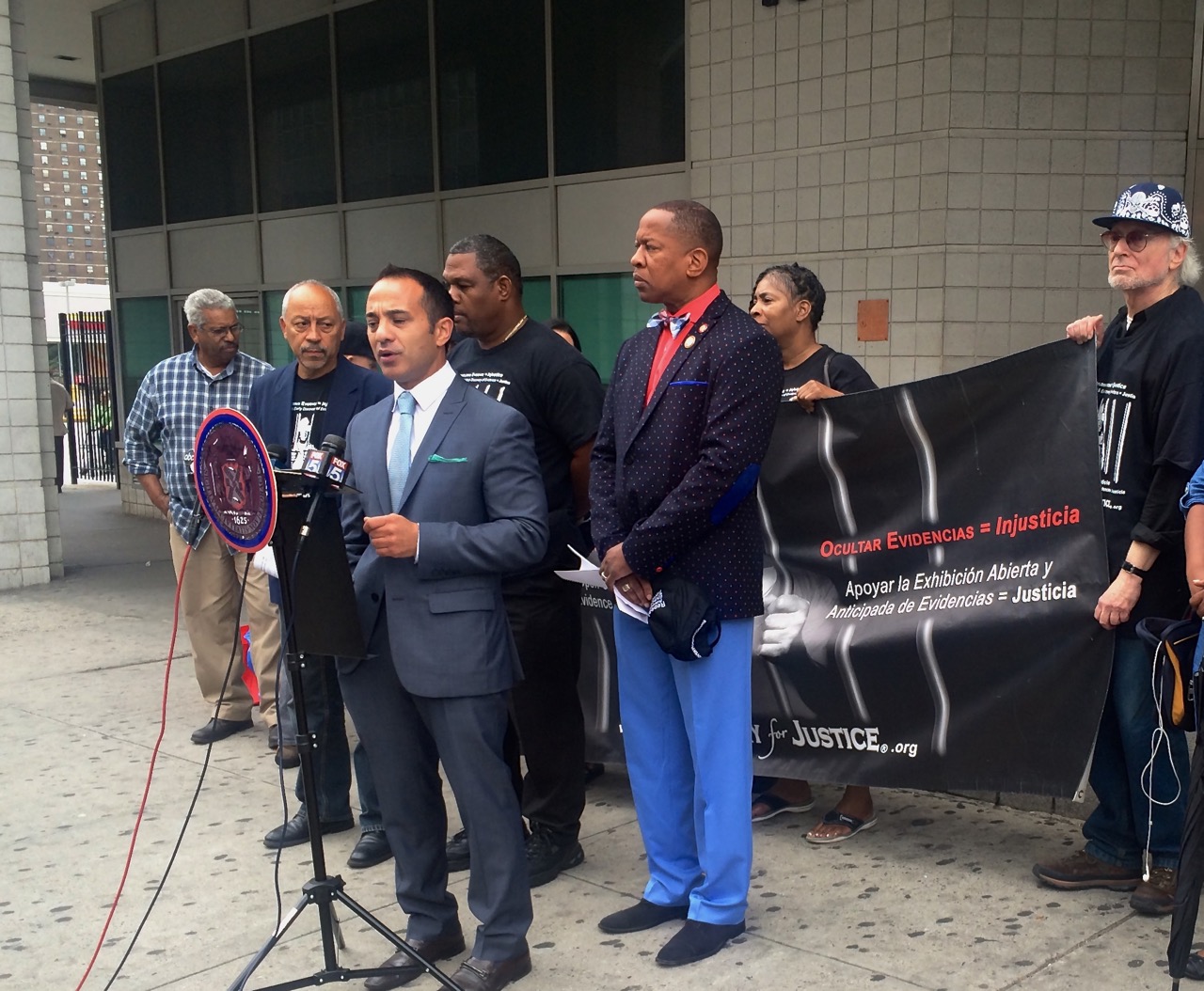
Photo by Jasmine Gomez
By JASMINE GOMEZ
“I can’t take it anymore,” were the words Kalief Browder, a 22-year-old Bronx man, uttered to his mother, the night before he hanged himself on June 6 from his home.
Now, Councilman Andy King, Browder’s attorney Paul Prestia, and community activists, have called for reforms to a criminal justice system they say failed Browder.
At a news conference June 18, King described Browder’s story as “reflecting the experience of so many who become broken by a broken system.”
Browder’s death, and the circumstances that led to it, has spurred renewed debate on the fairness of discovery procedures between the prosecution and defense. At the news conference, supporters of Browder’s argued had he’d been given more time to prepare for his case, he would have had a better chance at getting out of trouble sooner.
“This is one of the reasons why I’m introducing to the City Council Resolution 430, calling on New York State Legislature to pass, and the Governor sign, to repeal Criminal Procedure Law Article 240 and replace it with a law mandating early, open and automatic retrial discovery,” said King. The latter would be proposal Criminal Procedure Article 245–which would allow for earlier discovery (both prosecutor and defendant would have to submit evidence earlier on in the case) to be more fair.
“It will help innocent or overcharged defendants prepare for trial. It will encourage guilty defendants to plead guilty without needless or costly delays,” said King of the proposal.
But compounding Browder’s troubles was no money to post bail, and an initial public defender with little interest in the case, leaving him to await trial at Rikers Island for three years for a crime he was yet to be tried on.
As his case languished in the courts, Browder’s public defense was unable to move the trial forward because of numerous delays and adjournments granted to the prosecution. Prestia argued prosecutors deliberately delayed the case to force a guilty plea out of Browder.
Though prosecutors requested one-week adjournment, they were often given months to push back their case given the severe backlogging of the Bronx courts.
Because of Criminal Procedure Law 240, Browder remained unaware of the weak case the prosecution was attempting to build against him. As it stands, defense attorneys are presented with evidence at the very beginning of trial.
“You get the evidence, which is essentially the discovery in the case, minutes before you start. That’s not adequate time to access a case, prepare a case, and it doesn’t leave an even playing field,” said Prestia, who called for the repeal of CPL 240.
CPL 240 also applies to prosecutors withholding its list of witnesses it plans to put on the stand until the start of trial.
Embroiled With The Law
Browder and a friend were arrested in 2010 after a man told police officers that they had allegedly robbed him of his backpack containing several items including valuables and cash. Browder long maintained he was innocent, but he was charged with grand larceny, robbery, and assault.
His friend was able to leave the next day. But a judge, offering little leniency to Browder because of a previous offense where he also claimed innocence, set his bail at $3,000.
Lacking the resources to cover his bail, Browder found himself at Riker’s Island, a stay that would change the course of his life.
Life in Rikers
Jailed at the Robert N. Davoren Center, Browder was jailed among violent gangs monitored by hostile corrections officers who used beatings as a punitive measure. Browder endured numerous months in solitary confinement for fighting where his only source of human interaction would be receiving food through a slot on the door, along with beatings from officers and inmates that were caught on surveillance video, according to a report by The New Yorker.
Throughout the course of his stay at Riker’s Island, Browder was offered several plea deals that would have virtually ensured his immediate release, but adamant on not pleading false guilt in exchange for a return to normal life, he refused each one.
Life Outside
Browder was eventually released from prison, three years after he entered, all because the prosecution had lost contact with the witness, eventually unable to meet their burden of proof. Browder’s stay at Riker’s had deteriorated his mental state so badly that he retreated into a paranoid state of mind. As he struggled to readjust to living life outside of a jail cell, there were some tell-tale signs that he was not the same. He threw out his television for fear that it was watching him, spent time at the psychiatric wards at Harlem Hospital and St. Barnabas Hospital, and most unfortunate he attempted suicide four times.
Prestia, Browder’s attorney, has now filed a lawsuit alleging that the prosecution continuously delayed the case to attain a guilty plea from Browder.
Prestia, Browder’s second attorney, believes that Browder’s death was unnecessary. “[T]his could have all been avoided. But it’s not too little too late for other young men and women who still have to go through that system,” said Prestia.
No Bail
Browder’s death inspired the city to fast track the creation of a $1.4 million citywide bail fund, designed to cover the cost of someone’s bail to keep them out of jail. Many have argued that the linchpin to Browder’s troubles was the high bail set.
Taxpayer monies will cover the cost of the bail fund.
“There currently are pilots in place that have demonstrated to be successful,” said New York City Council Speaker Melissa Mark-Viverito, who called Browder’s death a “wake-up call” to a broken bail system.




